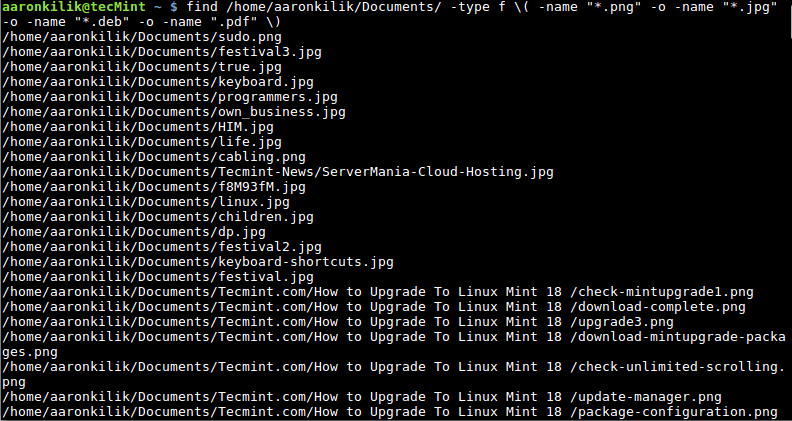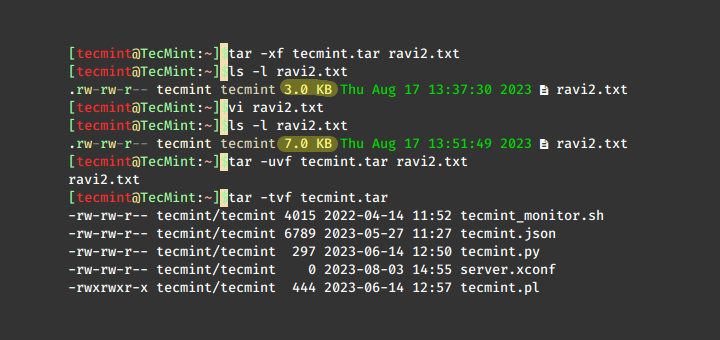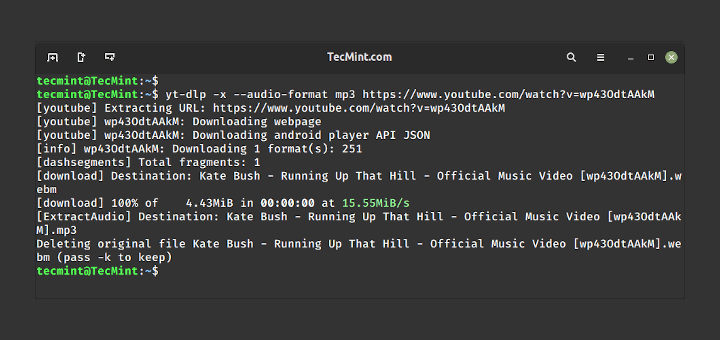Many times, we are locked in a situation where we have to search for multiple files with different extensions, this has probably happened to several Linux users especially from within the terminal.
There are several Linux utilities that we can use to locate or find files on the file system, but finding multiple filenames or files with different extensions can sometimes prove tricky and requires specific commands.

One of the many utilities for locating files on a Linux file system is the find utility and in this how-to guide, we shall walk through a few examples of using find to help us locate multiple filenames at once.
Before we dive into the actual commands, let us look at a brief introduction to the Linux find utility.
The simplest and general syntax of the find utility is as follows:
# find directory options [ expression ]
Let us proceed to look at some examples of find command in Linux.
1. Assuming that you want to find all files in the current directory with .sh and .txt file extensions, you can do this by running the command below:
# find . -type f \( -name "*.sh" -o -name "*.txt" \)

Interpretation of the command above:
.means the current directory-typeoption is used to specify file type and here, we are searching for regular files as represented byf-nameoption is used to specify a search pattern in this case, the file extensions-omeans “OR”
It is recommended that you enclose the file extensions in a bracket, and also use the \ ( back slash) escape character as in the command.
2. To find three filenames with .sh, .txt and .c extensions, issues the command below:
# find . -type f \( -name "*.sh" -o -name "*.txt" -o -name "*.c" \)

3. Here is another example where we search for files with .png, .jpg, .deb and .pdf extensions:
# find /home/aaronkilik/Documents/ -type f \( -name "*.png" -o -name "*.jpg" -o -name "*.deb" -o -name ".pdf" \)

When you critically observe all the commands above, the little trick is using the -o option in the find command, it enables you to add more filenames to the search array, and also knowing the filenames or file extensions you are searching for.
Conclusion
In this guide, we covered a simple yet helpful find utility trick to enable us find multiple filenames by issuing a single command. To understand and use find for many other vital command line operations, you can read our article below.
Don’t Miss: Master Linux ‘find’ Command with This 35-Examples







Very helpful post, it helped me to remove malicious files from 20 WordPress sites, it was hard to find and manually delete them.
@tyson
We are glad that this guide helped you. Thanks for the feedback.
copying alternate lines from file to specified directory
How to find all
.cppfiles which consist of sub string shares in the file name?Ravi,
Thanks for sharing.
How to use the find command to search for a file with a range of dates?
@Karl
You can use a similar command like this:
For more information, see the find man page.
You can pipe the output of find to egrep:
@anonymous
Useful tip, thanks for sharing.
ls *.ext1 *.ext2
seems to be way simpler.
@vlad
That works but it may not be efficient and reliable enough for the job, especially when you want to search in several locations.
“ls” works only for current directory content listing. It won’t search files recursively in any sub directories if available. So, we need to use find command only which will search in sub-directories also.
Another way is using
-regextypeand-iregexswitch, fore example:$ find . -regextype posix-egrep -iregex '.*\.(xml|txt)$' -type fThe above command find all files with xml or txt extension.
@Libreman,
Thanks for the great tip, If find it really very useful commandline trick to achieve the same results, hope it will be useful to others..